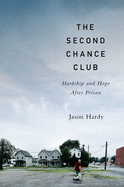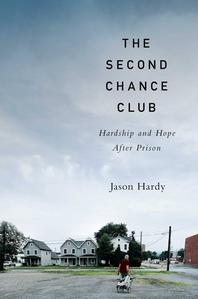
 Frustrated by a series of dead-end jobs, Jason Hardy became a parole officer in New Orleans in an attempt to do some good in the world. A white, well-educated man from a middle-class family, he soon realized his upbringing and advantages had given him almost no context for the people and problems he would encounter in his new job. The Second Chance Club, Hardy's first book, gives a thoughtful, timely account of the largely hidden probation-and-parole arm of the U.S. criminal justice system.
Frustrated by a series of dead-end jobs, Jason Hardy became a parole officer in New Orleans in an attempt to do some good in the world. A white, well-educated man from a middle-class family, he soon realized his upbringing and advantages had given him almost no context for the people and problems he would encounter in his new job. The Second Chance Club, Hardy's first book, gives a thoughtful, timely account of the largely hidden probation-and-parole arm of the U.S. criminal justice system.
Hardy takes readers inside the nitty-gritty routine of a parole officer's days and weeks: checking up on offenders who have served jail or prison time and trying to help them find employment, stay off drugs or get the physical or mental health care they need. A parole officer must also weigh the risks the offender is facing against the risks they present to their communities: many offenders end up hurting themselves or other people out of sheer desperation, and officers must try to step in before that happens. The book's narrative follows Hardy, a few of his coworkers and several of the offenders (all composites, but vividly drawn) who fall under their responsibility.
Mass incarceration in the U.S. is increasingly well documented, but probation and parole (P&P) receives much less attention and funding, especially at the state level. Hardy and his colleagues bump up constantly against the limits of the resources they can offer to offenders, even though studies have shown that access to stable housing, health care and other basic needs helps to reduce recidivism at overwhelming rates. They also encounter tangles of issues that would stymie a team of trained mental health professionals: addiction, abandonment, depression and anxiety, often paired with physical ailments. Many offenders' family members and friends walk the fine line between support and enabling. During his four years in P&P, it's a line Hardy comes to know well.
While Hardy is unstinting in his call for more resources and greater care to help offenders find their footing and build stable lives, his tone is also pragmatic. To his own chagrin, he recognizes that the system simply cannot help every offender, and that some--like Damien, a young, charismatic drug dealer he meets--would rather work the system than use it to walk toward change. But, Hardy argues, it's worth investing in offenders because they are people: human beings who have made mistakes, struggled against overwhelming odds and deserve a chance at lasting happiness.
Well-researched, compelling and deeply humane, The Second Chance Club is an important addition to the voices calling for criminal justice reform in the U.S. --Katie Noah Gibson, blogger at Cakes, Tea and Dreams
Shelf Talker: Former parole officer Jason Hardy gives a compelling account of his time supervising offenders in New Orleans.

